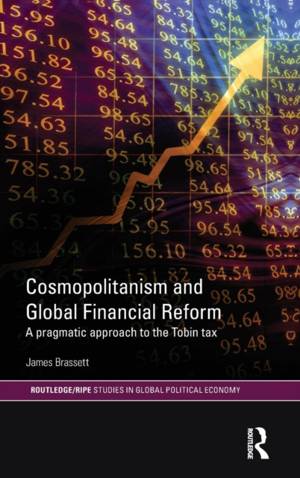
- Afhalen na 1 uur in een winkel met voorraad
- Gratis thuislevering in België vanaf € 30
- Ruim aanbod met 7 miljoen producten
- Afhalen na 1 uur in een winkel met voorraad
- Gratis thuislevering in België vanaf € 30
- Ruim aanbod met 7 miljoen producten
Omschrijving
Acknowledgement of the ethical dimension of global finance is commonplace in the wake of financial crises. The sub-prime crisis and ensuing credit crunch are only the latest in a long run of global financial crises that wreak social havoc and force us to consider alternative possibilities for global finance.
By defining cosmopolitanism and analysing how cosmopolitan ideas can increasingly provide an account of the governance of global finance, Brassett examines whether global finance can be regulated so as to provide cosmopolitan values like social security, equality and democratic accountability. It suggests that such an exercise is not adequately resourced by existing theoretical approaches to critical IPE and instead develops a new pragmatic approach based on the thought of Richard Rorty. Combining ethical theory with empirical analysis, it focuses on the Tobin Tax - (a proposal to place a small levy on foreign currency transactions to dampen speculation and raise vast revenues) - and explores whether it could underpin more cosmopolitan forms of global financial governance.
This book situates cosmopolitan ideas in the extant dilemmas and indeterminacies of global ethics, suggesting alternatives where possible. It will be of interest to students and scholars of international ethics, global governance, global civil, international relations, international political economy, global finance, public policy, critical theory, political theory and philosophy.
Specificaties
Betrokkenen
- Auteur(s):
- Uitgeverij:
Inhoud
- Aantal bladzijden:
- 160
- Taal:
- Engels
- Reeks:
Eigenschappen
- Productcode (EAN):
- 9780415552172
- Verschijningsdatum:
- 19/07/2010
- Uitvoering:
- Hardcover
- Formaat:
- Genaaid
- Afmetingen:
- 160 mm x 236 mm
- Gewicht:
- 385 g

Alleen bij Standaard Boekhandel
Beoordelingen
We publiceren alleen reviews die voldoen aan de voorwaarden voor reviews. Bekijk onze voorwaarden voor reviews.









